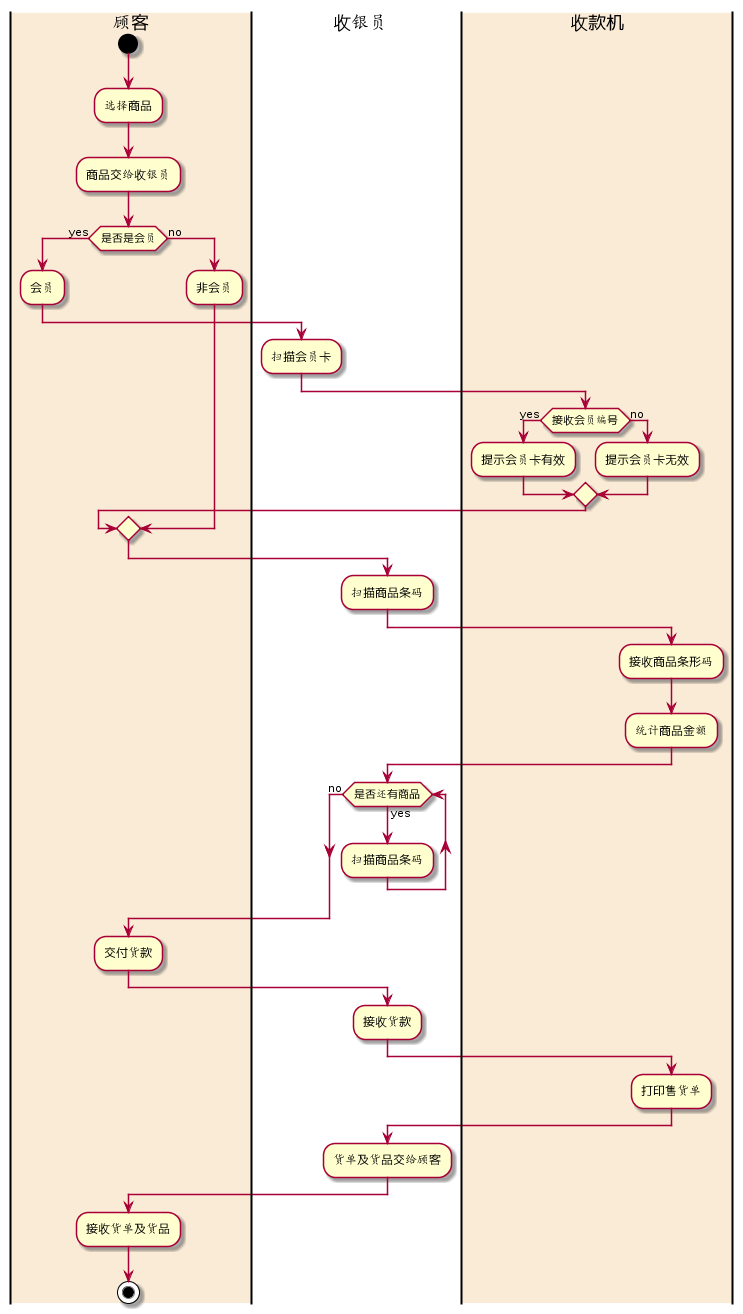一、学习小结:
1.开始和结束:使用关键字start和stop表示图示的开始和结束。
@startuml
start
:Hello world;
:This is on defined on
several **lines**;
stop
@enduml

也可以使用 end 关键字。
@startuml start :Hello world; :This is on defined on several **lines**; end @enduml

2.条件语句 :在图示中可以使用关键字if,then和else设置分支测试。标注文字则放在括号中。
@startuml start if (Graphviz installed?) then (yes) :process all\ndiagrams; else (no) :process only __sequence__ and __activity__ diagrams; endif stop @enduml
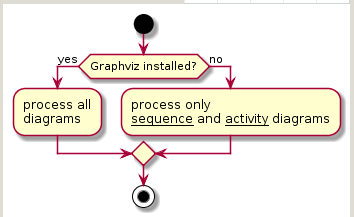
也可以使用关键字elseif设置多个分支测试。
@startuml
start
if (condition A) then (yes)
:Text 1;
elseif (condition B) then (yes)
:Text 2;
stop
elseif (condition C) then (yes)
:Text 3;
elseif (condition D) then (yes)
:Text 4;
else (nothing)
:Text else;
endif
stop
@enduml
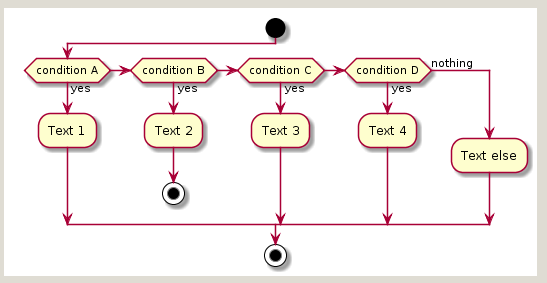
3.重复循环:使用关键字repeat和repeatwhile进行重复循环。
@startuml start repeat :read data; :generate diagrams; repeat while (more data?) stop @enduml
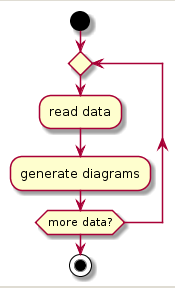
4.while循环:使用关键字while和end while进行while循环。
@startuml start while (data available?) :read data; :generate diagrams; endwhile stop @enduml
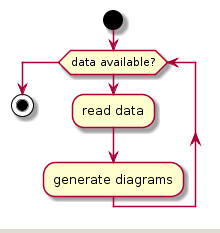
可以在关键字endwhile后添加标注,还有一种方式是使用关键字is。
@startuml while (check filesize ?) is (not empty) :read file; endwhile (empty) :close file; @enduml
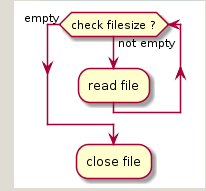
5.并行处理:使用关键字fork,fork again和end fork表示并行处理。
@startuml start if (multiprocessor?) then (yes) fork :Treatment 1; fork again :Treatment 2; end fork else (monoproc) :Treatment 1; :Treatment 2; endif @enduml

6.注释
文本格式支持creole wiki语法。
A note can be floating, using floating keyword.
@startuml start :foo1; floating note left: This is a note :foo2; note right This note is on several //lines// and can contain <b>HTML</b> ==== * Calling the method ""foo()"" is prohibited end note stop @enduml
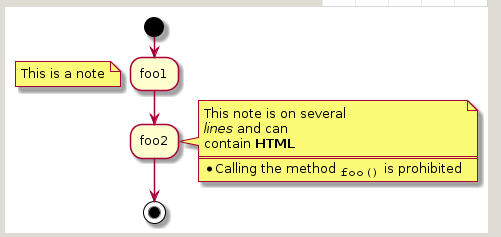
7.颜色:活动(activity)指定一种颜色。
@startuml start :starting progress; #HotPink:reading configuration files These files should edited at this point!; #AAAAAA:ending of the process; @enduml
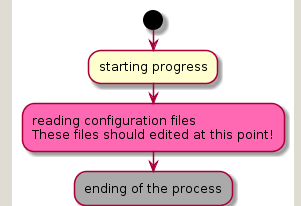
8.箭头:
使用->标记,你可以给箭头添加文字或者修改箭头颜色。
同时,你也可以选择点状 (dotted),条状(dashed),加粗或者是隐式箭头。
@startuml :foo1; -> You can put text on arrows; if (test) then -[#blue]-> :foo2; -[#green,dashed]-> The text can also be on several lines and **very** long...; :foo3; else -[#black,dotted]-> :foo4; endif -[#gray,bold]-> :foo5; @enduml

9.连接器:使用括号定义连接器。
@startuml start :Some activity; (A) detach (A) :Other activity; @enduml
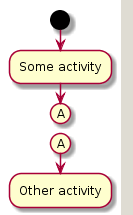
10.组合:通过定义分区(partition),你可以把多个活动组合(group)在一起。
@startuml
start
partition Initialization {
:read config file;
:init internal variable;
}
partition Running {
:wait for user interaction;
:print information;
}
stop
@enduml
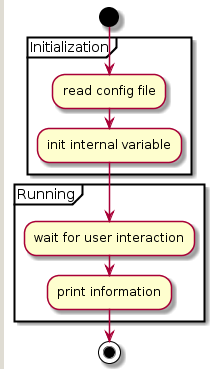
11.泳道:可以使用管道符|来定义泳道,还可以改变泳道的颜色。
@startuml |Swimlane1| start :foo1; |#AntiqueWhite|Swimlane2| :foo2; :foo3; |Swimlane1| :foo4; |Swimlane2| :foo5; stop @enduml
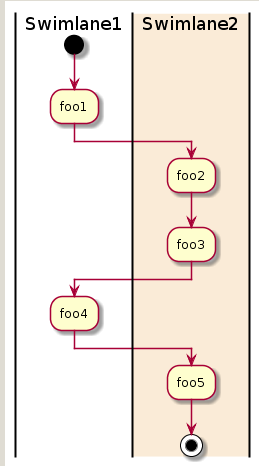
12.分离:使用关键字detach移除箭头。
@startuml :start; fork :foo1; :foo2; fork again :foo3; detach endfork if (foo4) then :foo5; detach endif :foo6; detach :foo7; stop @enduml

13.特殊领域语言:
通过修改活动标签最后的分号分隔符(;),可以为活动设置不同的形状。
|<>/]}-
@startuml :Ready; :next(o)| :Receiving; split :nak(i)< :ack(o)> split again :ack(i)< :next(o) on several line| :i := i + 1] :ack(o)> split again :err(i)< :nak(o)> split again :foo/ split again :i > 5} stop end split :finish; @enduml

二、超市购物
流程:
顾客:选择自已所要购买的商品,并把选好的商品拿到收银台交给收银员。
收银员:询问顾客是否是会员,如果是会员,索要顾客的会员卡,把会员卡扫描进系统并对会员卡进行验证。然后逐一扫描顾客所 选商品的条形码。扫描完商品信息后,根据收款机上显示的商品金额收货款,售货单和商品交给顾客。
收款机:边接收商品条码,边累加商品金额,打印售货单。
脚本:
@startuml
|顾客|
start
:选择商品;
:商品交给收银员;
|#AntiqueWhite|顾客|
if (是否是会员) then (yes)
:会员;
|收银员|
:扫描会员卡;
|#AntiqueWhite|收款机|
if (接收会员编号) then (yes)
:提示会员卡有效;
else (no)
:提示会员卡无效;
endif
else (no)
|顾客|
:非会员;
endif
|收银员|
:扫描商品条码;
|收款机|
:接收商品条形码;
:统计商品金额;
|收银员|
while (是否还有商品) is (yes)
|收银员|
:扫描商品条码;
endwhile (no)
|顾客|
:交付货款;
|收银员|
:接收货款;
|收款机|
:打印售货单;
|收银员|
:货单及货品交给顾客;
|顾客|
:接收货单及货品;
stop
@enduml
